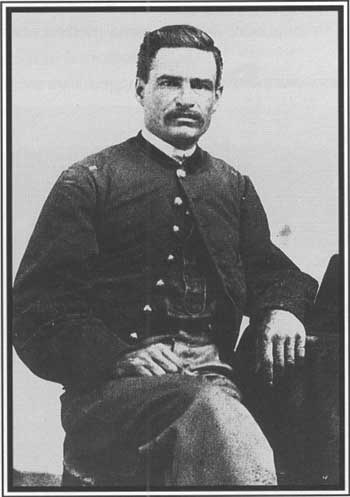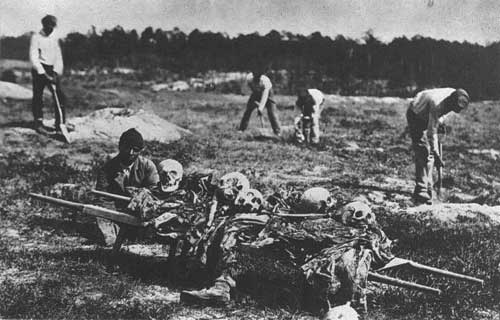|
BLACK OFFICERS
When Butler brought the Louisiana Native Guards into Federal service
in August 1862, he appointed white and black officers alike, "precisely
as I found intelligence." All told, he doled out commissions to some
seventy-five black men as captains and lieutenants and one as a major.
In Kansas, Jim Lane, who believed he needed no authorization to recruit
a black regiment, also saw no need to seek approval for appointing a
highly qualified black as captain. The prospects for black officers
seemed promising.

|
FIRST SERGEANT STEPHEN SWAILS OF THE 54TH MASSACHUSETTS FIRST BLACK
SOLDIER TO BE COMMISSIONED AN OFFICER IN A MASSACHUSETTS REGIMENT. (LC)
|
Just as swiftly, the door on black officership slammed shut. The War
Department refused Lane's regiment and particularly his black captain.
In early 1863, Governor Andrew sought permission to appoint a few
patently qualified African Americans as officers in the 54th
Massachusetts. The War Department rejected the suggestion. And when the
War Department replaced Butler as commander of the Department of the
Gulf with Banks, he immediately undertook efforts to rid himself of the
black officers in the Native Guards. Banks insisted that a black officer
"demoralizes both the white troops and the negroes." He challenged their
competency, and when that failed, Banks humiliated them at every
opportunity, until pride no longer permitted them to endure such abuse
and they resigned.
In truth, the issue had little to do with qualifications and
everything to do with racial prejudice. Whites did not like to serve
alongside black privates, let alone black officers. Whites attempted to
justify their opposition to black officership by claiming that men of
African descent lacked leadership ability, or there were not enough
satisfactorily educated black men in the entire country to fill the
officers' slots in a single regiment. In certain instances, whites
tolerated black chaplains and surgeons for black regiments, but they
would go no farther.

|
SECOND LIEUTENANT WILLIAM H. DUPREE OF THE 55TH MASSACHUSETTS INFANTRY
REGIMENT. (USAMHI)
|
Throughout their service black soldiers complained bitterly over the
lack of opportunities for advancement into the officers' ranks.
Certainly black officers had served well at Port Hudson. "All that we
ask," pleaded a black sergeant, "is to give us a chance, and a position
higher than an orderly sergeant, the same as white soldiers, and then
you will see that we lack nothing." Frederick Douglass's son Lewis, a
sergeant major and combat veteran, insisted that there was plenty of
officer material in the USCT: "In regard to the capability of colored
men to perform the duties of commissioned officers, we would
respectfully suggest that there are hundreds of non-commissioned
officers in the colored regiments who are amply qualified for these
positions, both by education and experience." Black soldiers were not
asking for any special favors. "Let the Board at Washington be opened
for the examination of colored men," a black soldier suggested, "and I
have no fear for the result."
In the late stages of the war a number of black soldiers did receive
commissions as officers, primarily through the tireless efforts of
Governor Andrew. Six enlisted men in the 54th and 55th Massachusetts
gained lieutenancies in those regiments, and this breakthrough paved the
way for five more men to acquire commissions, three of them in an
artillery battery.

|
BLACK TROOPS WERE OFTEN ASSIGNED TO FATIGUE DUTY. THESE SOLDIERS ARE ON
BURIAL DETAIL. (LC)
|
All told, perhaps 110 African Americans had made it into the
officers' ranks. Other than those 75 men who secured commissions under
the auspices of Butler, most were chaplains or surgeons. Those gains at
the tail end of the war were a hollow victory because so many more
blacks who genuinely merited promotions never received serious
consideration for them.
|
|
